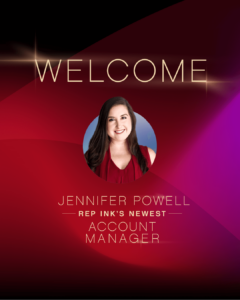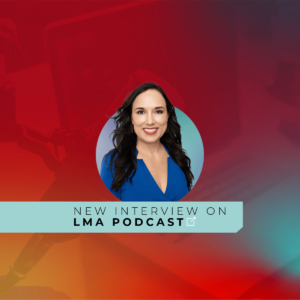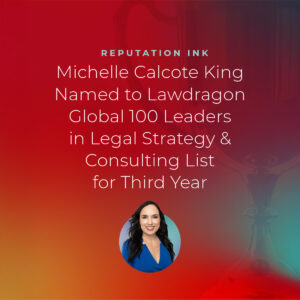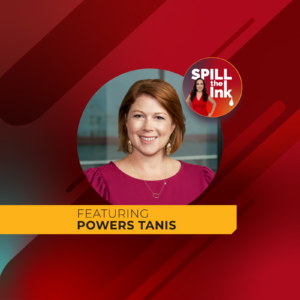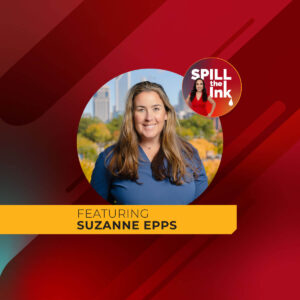
Spill the Ink: The Reputation Ink Podcast
What non-attorney CEOs bring to law firm operations
It’s as untraditional as it gets, but having a non-attorney in the driving seat of your law firm can do wonders for streamlining operations, enhancing the client experience and strengthening team culture. But it’s not without its challenges — as our guest discovered when he built a law firm from the ground up (with the help of a team of attorneys) in just two weeks.
Before Jonathan Delk was CEO of Colorado-based JVAM, he was a ski instructor-turned-digital marketer with a Master of Business Administration. In this episode, he tells Michelle Calcote King how he leveraged those skills and experiences to support and enhance the firm’s legal work by finding new ways to innovate and build a team culture that attracts talent from around the country. Jonathan also shares his take on how technology will disrupt the legal industry in the coming years.
Here’s a glimpse of what you’ll learn
- How Jonathan went from ski instructor to digital marketer to law firm CEO
- About Colorado-based law firm JVAM, which believes in specialization (no one team member should do everything all the time)
- The benefits of allowing a non-attorney (or non-practicing attorney) to call the shots.
- The biggest hurdles of leading a firm without a law degree, including navigating the occasional, “Wait, you’re not a lawyer?!”
- How to obtain buy-in as a non-attorney leader
- Why marketing skills are the special sauce for client experience and firmwide communication
- How artificial intelligence and automation will disrupt how law firms operate
About our featured guest
Jonathan Delk is responsible for all facets of JVAM’s business outside the practice of law, including general management of finance, human resources, location management, information services and business development. Specializing in legal management, Jonathan works to keep JVAM at the forefront of practice management and an employer of choice in the legal field.
Jonathan attended the University of Colorado, Boulder, where he double majored in Economics and Political Science. Later, he earned a Master of Business Administration at Colorado State University, focusing heavily on finance and leadership.
Before starting his career in the legal industry, Jonathan worked in the outdoor industry as a professional ski and snowboard instructor, and a trail guide and coach for downhill and cross-country mountain biking. For years, he tallied 200-plus days a year on snow between Aspen, Colorado and Queenstown, New Zealand. Now, he takes his ski days with his wife, Erin, and daughter, Amelia.
Resources mentioned in this episode
- Check out JVAM
- Follow JVAM on LinkedIn
- Connect with Jonathan Delk on LinkedIn and X
- Say hello to Michelle Calcote King on X and LinkedIn
Sponsor for this episode
This episode is brought to you by Reputation Ink.
Founded by Michelle Calcote King, Reputation Ink is a public relations and content marketing agency that serves professional services firms of all shapes and sizes across the United States, including corporate law firms and architecture, engineering and construction (AEC) firms.
Reputation Ink understands how sophisticated corporate buyers find and select professional services firms. For more than a decade, they have helped firms grow through thought leadership-fueled strategies, including public relations, content marketing, video marketing, social media, podcasting, marketing strategy services and more.
To learn more, visit www.rep-ink.com or email them at [email protected] today.
Transcript
[00:00:00] Jonathan Delk: I would say my marketing understanding has really bolstered the understanding and the fulfillment of the client journey, and us achieving what attorneys really hope to have in a law firm.
[music]
[00:00:14] Announcer: Welcome to “Spill The Ink,” a podcast by Reputation Ink, where we feature experts in growth and brand visibility for law firms and architecture, engineering and construction firms. Now, let’s get started with the show.
[music]
[00:00:31] Michelle Calcote King Hi, and thanks for being here for another episode of “Spill the Ink.” I’m Michelle Calcote King. I’m your host, and I’m also the Principal and President of Reputation Ink. We are a public relations and content marketing agency for B2B professional services firms, including law firms. To learn more, go to www.rep-ink.com.
Law firms are usually run by attorneys, but every now and then — and starting more and more — you have leaders who don’t have that J.D. behind their name.We’re talking to a CEO of a law firm with a very unique background. He is a ski instructor turned digital marketer turned law firm CEO.
We’re talking to Jonathan Delk. He’s the CEO of JVAM Law. It’s a Colorado-based law firm that offers a wide range of legal services to businesses and individuals. Welcome to the show, Jonathan.
[00:01:26] Jonathan: Thanks for having me, Michelle.
[00:01:27] Michelle: Yes, I’m really excited to talk about this. Tell me a little bit about your career path, and how you ended up in this role as CEO of this firm.
[00:01:36] Jonathan: Yes, so it’s probably as non-traditional as you could possibly get. I started shortly after undergraduate in Boulder, diving straight into the ski industry as a ski and snowboard instructor, and working in management ski areas, and then started living an endless winter life between Queenstown, New Zealand and Aspen, Colorado, teaching a skiing and snowboarding full-time, and working with PSIA-AASI, which is the instructor training and certification body.
From there, my then girlfriend, now wife, and I got engaged, and decided to settle down in the Roaring Fork Valley, which is the area that surrounds Aspen, Colorado. When we did that, it was time to make a career shift because no longer could I be year-round fulL-time in the winter.
I got involved in mountain biking, and coaching mountain biking. I’d always had a passion for cycling, and hadn’t done it for many years because of the endless winters.When I started coaching cycling, I got more involved with other organizations like the National Interscholastic Cycling Association (NICA), Colorado High School Cycling League, and eventually got to the point where I launched my own organization called Roaring Fork Cycling, a non-profit organization that brought opportunities to middle school kids around Aspen and the greater area. That’s the moment that business administration entered my life.
All of a sudden, I was running an organization with hundreds and hundreds of participants, 30 employees, tons of logistics and operations, tons of risk and liability. I needed a board of directors, and I needed to figure out how to run a business. That was the moment also that I decided that it was probably time to get some education. I applied and got enrolled into the Colorado State University Business School to get my MBA, and pursued that.
Then, once I graduated with that MBA, I got linked up with a law firm in Glenwood Springs, and started doing business operations. Then, that’s where the big pivot happened. We launched JVAM out of that firm. That’s when I took on this more senior executive role in administration.
[00:03:47] Michelle: What are some of the benefits about not being a lawyer in this role? It is rare to not be– The traditional structure is to have a managing partner. Tell me, what do you see as the pros for having somebody that is not practicing running the firm?
[00:04:05] Jonathan: Overall, the ethos of JVAM is specialization. We try not to have everybody doing everything all the time. The number one issue is, with a small firm, like a solo operator, you don’t need somebody with an executive mindset who takes responsibility. You just make the decisions, you’re small enough, you’re nimble enough, but you get to a certain size, where you have to build consensus, and bring all the shareholders and partners along in making decisions, and that is cumbersome.
If you don’t have very good board governance, then you can get burdened down with what kind of coffee maker to buy the office, and spend an hour having a conversation about, “Should we get the $100 one or the $200 one?” when the opportunity cost around the room was $3,000 on that conversation. That is the primary reason to have somebody who is fiscally-minded and operationally-minded making the small incremental decisions on a day-to-day basis with guidelines, or boundaries of strategy and budget.
We are able to execute quickly, and make good proactive decisions and reactive decisions on a day-to-day basis because it’s not burdened with the stealing the attention of several partners, and trying to get their buy-in, or help them come along in the decision-making process.
The reason I would say having a CEO, and especially, a non-attorney CEO — wouldn’t have to necessarily be a non-attorney but you’d have to be a non-practicing attorney — is you have to be so specialized that you’re not distracted from your core competency, or your contribution to the company, and you’re constantly having to balance that with, billables and clients because the billing and the client will always come first, and that will cause other things to suffer.
As long as there’s people in the organization that are prioritizing operations over revenue-generating activity, those operations can fulfill their opportunity to be as great as they can be. That’s it in a nutshell. Allowing people to focus on their contribution, and not be distracted, or dilute their contribution, we’re allowing different areas of the firm to excel, including revenue operation.
[00:06:10] Michelle: Right. According to, as you said a moment ago, a established strategy, benchmarks. It’s not like you’re just running around making decisions because you want to. You’ve got a very clear strategy that I’m guessing the partnership has bought into, they understand.
[00:06:28] Jonathan: Yes. We have cadence and meetings, and we have key objectives and goals for quarters and annuals, but we also do strategic planning on an annual basis with the partner, shareholders. We also do large format company-wide retreat, where we share some of that strategic planning, some of that vision, and create shared learning opportunities across the entire firm.
From day-one, it was a little bit like, “Okay, John, go.” It was, “Get us going and get us started.” Then, 6 to 12 months in, it was, “Okay. We’re running. Now, where do we go next?” That’s when we started making strategic decisions on personnel and growth and markets.
[00:07:17] Michelle: How did you get that, “Okay, John, go,” buy-in? Where did that come from, from the partners, that kind of trust and excitement to have somebody to have that non-traditional structure?
[00:07:29] Jonathan: It was day one. The original seven of us that started JVAM worked at another firm. Three of the partners, Casey Martin, Ben Johnston and Lucas Van Arsdale decided they were going to start another firm. I had a conversation with them and said, “Do you need help?” They said, “Yes.” That was when I made the decision to resign from my position at the other firm and get started.
That is a wild story, [chuckles] because I built a law firm from the ground up in two weeks.
[00:08:02] Michelle: Wow.
[00:08:03] Jonathan: That was everything. It was so important that, day one, when everybody walked in, they were able to do their work, and we were able to make sure that everybody was able to be benefited and paid. It was a tall order.
[00:08:17] Michelle: I bet. Yes. Two weeks setting up all the operational structure. Yes, I can imagine that that was wild.
What are some of the challenges that you find in the role? I know that is a huge question, but specific to the fact that you aren’t an attorney.
[00:08:36] Jonathan: People being confused and thinking I am an attorney. [chuckles] It’s always an awkward conversation, where they’re like, “Oh, you’re an attorney.” It’s like, “Actually, I’m not.” Then, they’re like, “Wait, what?” They’re so confused by it because it’s not a normal scenario. You could probably count up well under a hundred how many non-attorney chief executive officers there are in the country for law firms. That’s the first one.
I think the second one, I don’t experience this, but I can imagine others would, is constant questioning of decision-making and acumen, because you don’t have that J.D., you’re not a barred attorney, and attorneys are often the person that is sought out for guidance in complex situations and compliance, and those types of things.
I could see that being difficult.It can be difficult for me at times because of some of the touchy nature of subjects that may come up. In general, I’m able to tap partners within the firm for conversations, and build consensus, and usually get to the right decision pretty quickly with dialogue and research. I don’t really see a lot of that hurdle too much, but I would imagine it’s a little bit more cumbersome here than it would be in other companies for a chief executive officer.
Yes, those are some hurdles. My job, as much as it is operational, it’s so much more focused on culture. I think that’s where a lot of the latitude comes from because we prioritize culture so heavily, and making sure that this is a world-class place to work.
[00:10:09] Michelle: I’d love to hear more about that, especially, in the legal industry, that is a real distinctive move to focus on culture. Tell me a little bit more about what you’re doing there? What are some ways that you’re making it a really great place to work?
[00:10:22] Jonathan: JVAM, from day one, we wanted to be an employer of choice, and we wanted to do things that made working here the most ideal for any attorney in the state, if not the country. We’re starting to have applicants from New York and Philadelphia to come work in some of our small town offices. It’s pretty wild because we pay competitively and we take care of our team.
I would say, some of the primary things we circle around focus on not so much work-life balance, but making sure that everyone has a balanced life that feeds into their goals. We have very flexible billing requirements for our attorneys. There’s an annual commitment. Everyone has unlimited PTO on the attorney level, but they can set and remain full-time, they can set an annual commitment as low as 1,080 hours a year.
[00:11:13] Michelle: Wow.
[00:11:14] Jonathan: That’s pretty low. We do have thresholds for bonus eligibility, but it’s still a great salary, and the benefits are amazingly complimentary to that lifestyle. We pay 100% medical, dental, vision up to full family for premiums. We fund HSA up to the burden of the deductible, whether that’s for a single or full family. We have, again, that generous time-off policy.
We really focus on creating community. We have an annual ski day where we all go skiing together. We have an annual company raft trip. We have a corporate retreat, where we all go somewhere off-site for two days, and do some shared learning experiences. We throw an epic Christmas party every year, and we really focus on building relationships internally above and beyond just the day-to-day work collaboration.
Everyone in the company is eligible for that same benefit package. Whether you’re an administrative assistant, or the chief executive officer, everyone has access to the same benefits suite. I think by doing these things, we’ve created a deep relationship with the firm that goes above and beyond the transactional nature of, this is just a job. Very much feel supported and taken care of here, and feel a sense of responsibility to contribute in the ways they best can.
[00:12:30] Michelle: Yes, that’s fantastic. I love the flexibility. For some people, that lower billable requirement is right for them, and giving them that flexibility to choose that lifestyle, I can imagine that is a huge benefit.
The other thing I wanted to ask was your background in marketing, and how that has helped in this role.
[00:12:52] Jonathan: Legal marketing is a tricky beast. I would say, generally, marketing efforts can only account for roughly 10% to 20% of new clients and matters in a firm. The effort in legal marketing has more to do with brand reinforcement, and reputation reinforcement. I would put presence and public relations, and community outreach chief among the priorities compared to what you would look at in a traditional software as a service or other product marketing where you would focus on increasing knowledge, awareness and conversion. The funnel, if you will, looks different.
Being able to speak clearly and articulately about marketing, and quickly distill that, simplified the process of building the pipeline of new clients and new matters. I’ve worked with our director of practice management on developing the client journey, and the matter life cycle as a timeline with triggers and automation so that we can make sure that the process of initial contact to intake and conflict-checking and consultation, and engagement, and matter set up, and moving forward with matters, is as seamless as possible, but still remains high-touch.
This awareness, I would say, has created a bit of a special sauce at JVAM, if you will, where we focus on efficiency, coupled with in-person interactions, and a sense or a feeling of the client that, “Wow, this person has really helped me carry this along.” Using client relationship management software, and using all those tools that, typical, and other industries do, it’s helped accelerate us. The legal industry is a bit slow to the uptake on technology and systems like this. A lot of people like to just build an Excel sheet, keep track of their clients there, or—
[00:14:49] Michelle: Or it’s just all sitting in Outlook. Yes.
[00:14:53] Jonathan: Yes. Whereas today, you can design this into workflows. There’s practice management software that almost does it all for you. There’s no reason to reinvent the wheel. It’s just a matter of bringing people along into understanding their role in the process, and how to best fulfill that process. I would say, my marketing understanding is really bolstered the understanding and the fulfillment of the client journey, and us achieving what attorneys really hope to have in a law firm, which is, prompt, responsive communication, and helping move clients from initial contact to engagement as quickly as possible, but also while managing risk.
[00:15:32] Michelle: That’s interesting. I love the fact that you view marketing as client experience. A lot of people decouple the two. A lot of people think, “Well, marketing’s just getting the client in the door,” and they forget that it’s the whole lifecycle of the relationship. It’s truly that full client experience.
[00:15:52] Jonathan: Over 40% of our new matters are from existing clients or referred clients. One, I know that information, and to have that information on hand, means that we’re doing a lot of data entry, and we’re doing a lot of analysis. There’s marketing that builds into that, and you have to know that information of your source, right? Your lead source.
Two, if that’s the characteristic of the pipeline of your new clients that are coming in, they’re either existing clients, or direct referrals from other relationships within the community, how people experience you, has a huge impact on whether or not somebody else will come, and work with you again. If you emphasize the relationship, and you look at the relationship as a source of future opportunities of work, then a hundred-percent, it’s marketing.Everything we do is marketing, and everyone in the firm has a responsibility to marketing.
There’s an expectation that our firm amongst our assistants, when someone initially contacts the firm, if they fill out a form online, we’re supposed to call them within the first two hours of the next business day. If someone gets through to voicemail during business hours, they’re meant to be called back as quickly as possible. That is the next priority task.
We have four people on the phones all day, every day, so that nobody gets kicked through the voicemail. Every time someone calls, they get to talk to a real person, and that real person can help them solve their problem. That has been a massive uptick in client experience. There’s very few law firms that you can call and talk to a real person on the phone, and have them help you immediately.
Our responsiveness to the community has helped bolster that reputation, and it goes beyond your job. We coach the entire team, not just attorneys, that who you are in the community, how you behave in the community. We want you to wear your role with our firm as a badge of honor. We want you to be proud that you work here, and we want you to share that with everyone in the community.
We also want us to be proud that you are out there doing that. We do a lot of coaching on professionalism, and this responsibility to uphold the brand integrity on a more global scale. It’s had huge positive impacts. People walk around with their branded JVAM stuff, and they’re proud, but we do little things that just help remind people of where they work, and that they’re out there representing us, whether they’re on the clock or not.
[00:18:16] Michelle: Yes, they’re brand ambassadors. They are the people that are living out your brand. Yes, very smart.
I want to talk a little bit more broadly about what are some of the bigger trends that you’re now looking at that are going to impact the way you run the firm? Are there any big changes coming down the pike that are something that you’re looking at?
[00:18:37] Jonathan: We’re at the precipice of major shifts in the way legal work is accomplished. It’s never going to take away the actual knowledge work, or the critical thinking, or the attention to detail, or the administrative hurdles. All those things are going to exist. All those things take time, and that time has to be billable.
I’m not saying it’s not going to be like an absolute industry disruption, but much like the typewriter disrupted handwritten documents, and much like the computer disrupted the typewriter, we’re in a world now where artificial intelligence and automation are beginning to disrupt drafting, and beginning to disrupt research, and beginning to disrupt formatting. Those elements, it’s going to make things smoother, it’s going to make things faster, it’s going to push quality up, and I think it’s going to require everyone to level up a bit. It’s going to come with its own hurdles and complicators but I think, what’s coming down the pike is, I think, more prompt distillation of information and conclusions, without as much burden on manual research.
Everything is always getting more efficient. How you deal with that efficiency, and how that efficiency gets passed on to the consumer, is going to be the main thing that I think requires some thought.
That’s macro though. We’re talking five years, I think, where we’re going to actually start– I mean, we’re seeing it now, but in five years, I think we’re going to see it more globally, and more universally, or amongst firms.
I think other things that are coming on pike is this dispersed workforce. I think right now we’re seeing this really weird shift in corporate real estate and offices. There’s a swing to get back in the office, but there’s still massive amounts of offices that are sitting empty. Some companies have embraced remote work. Some companies haven’t.I think it really just depends on, what your P&L looks like, and can you afford offices? For those who can work remotely, and you can eliminate that office expense from your P&L, you’re creating a greater opportunity for profitability, especially, in that small-to-midsize firm space.
Large firm space, I’m sure it’s the same, but again, there’s a scaling opportunity there, where having an office is essential, and having it a little bit bigger, isn’t necessarily that much more expensive, and so I can see why big law firms are in that swing to come back to the office, to have in-person collaboration, those types of things, but for the small-to-midsize firm, I definitely think that, that’s going to be a dividing line in the experience of at least partners, and their profitability.
It’s going to be interesting to see how this shakes out over the next five years, because it’s a huge expense to have offices. In the large markets, they’re empty, and [chuckles] I can go buy a skyscraper in St. Louis for the same price of my offices in Basalt.
[00:21:16] Michelle: Yes, absolutely.
[00:21:18] Jonathan: And the offices in Basalt are definitely not a skyscraper. [laughs]
[00:21:21] Michelle: I think it also impacts who you’re able to hire, too. You’re able to pick up certain people that that’s a very big benefit to them to have that flexibility in there, and where they work, and how they work. Yes, there’s other implications to that.
[00:21:35] Jonathan: Yes. We foster that flexibility regardless. All of our attorneys have an office, all of our employees have a workstation, no matter what. We have flex desks in all of our offices. People travel between the offices to hotel or work, other locations. We do a lot of the sharing, meeting attorneys, or other people say, “Hey, I’m going to be in Basalt. Do you want to work in Glenwood today? We can swap offices and you can work in my desk, and I’ll work at yours,” that kind of thing.
We can keep that flexibility. I like to take my family to Mexico. I go to a small fishing village for a week, usually, for spring break, and I work that whole week. It’s not hard. Maybe I’m not working full days, but I’m still paying attention to the business, taking calls, and making decisions, and making things happen for a few hours every day. There’s no reason people can’t work and travel at the same time, or blend that experience. We offer that. We’re absolutely okay with that.
[00:22:25] Michelle: Love that. Well, I’d like to ask if there’s one thought you’d want to leave our listeners with around our conversation.
[00:22:33] Jonathan: I think when it comes to branding, marketing, and working with law firms, there’s a lot of templates. Like, “Here, let me give you this template for how to have a website. Let me give you this template for how to have a brand.” Maybe you need to have the scales of justice in there or a chess board or something. It’s all so cookie-cutter and familiar.
Those are the types of things that make attorneys quite comfortable. Is it form? Is it template? Is it normal? My best recommendation is you don’t have to break the mold, but bring in some color, bring in some differentiation, buck the trend a little bit, and you will stand out against the group. And you will have an opportunity to set yourself apart a little bit, while still maintaining that professional reputation, image and approachability.
[00:23:23] Michelle: I love that.
[00:23:24] Jonathan: I think there’s a huge opportunity for growth in legal marketing, and to bring in creative aspects that enforce the priorities, rather than detract from them, which most attorneys, that’s their chief fear is, “I don’t want to come off the wrong way.”
[00:23:40] Michelle: I love that. I talk a lot about the fact that law is a risk-aversion field. Whereas I find marketing is a risk-taking field. It’s a, “See if this works. Let’s try this. Let’s see how people react.” Based in research, things like that, but you have to be a little bit of a risk-taker to be a great marketer. Often, the two hit head-on, and you’re right, there’s real opportunity for firms to differentiate, if they can be a bit more creative, and stop looking to see what every other firm is doing, and mimicking them
[00:24:15] Jonathan: Let me parlay on that one. One last note, there’s this phrase in the legal field of minders, finders, and grinders. I find that minders and grinders like to use their contribution or their default as a reason not to have soft skills and good interpersonal skills. If over 40% of our new matters are either existing clients or referrals from those existing clients, how important are our interpersonal skills to bringing in that next client?
If the relationship is left to the minder or the grinder and they don’t necessarily have those interpersonal skills to keep the client happy and engaged, then you’re going to lose that client. I can’t tell you how many times I get a phone call that—
I took an intake just the other day, because that’s the kind of guy I am. Some of my team has to take a time off, I will put myself on the phones, and I’ll run intakes.Keeps me close to the client. Helps me understand the processes and procedures. Helps me get better coaching on how this should work on a day-to-day basis. Plus, everyone feels super supported that their boss is willing to do their job, while they’re gone, rather than create a pile of work for them when they take time off. All those things.
I get a phone call, and it said, “I was working with this attorney. He retired. He referred me to this other guy. This other guy never returns my calls, never returns my emails. I’ve never Googled for an attorney before, but I’m worried about this. I don’t know how this works. I’ve always just been introduced to other people.”
I said, “Hey, don’t worry about it. Let’s talk through it.” Gave him the whole spiel.I told him how we’re going to be responsive to him. I set an expectation that I knew that we could exceed. We immediately exceeded his expectation. Got him scheduled for a consultation. The person that he’s working with, is literally across the street from the commercial space that he needed some legal representation on, and he felt immediately taken care of and cared for. He said, “I’ve had more interaction with your firm in two days than I did with my prior attorney from representing me for the last six months.”
[00:26:11] Michelle: Love that.
[00:26:13] Jonathan: That’s how it should be. That emphasis, if your intake people have great interpersonal skills and soft skills, if all your attorneys have great interpersonal skills and soft skills, that little bit of following through, meeting and exceeding expectations, and fulfilling needs and solving problems, will only reinforce the brand. It all comes back to client experience.
[00:26:34] Michelle: Yes. Oh, great. Really great points. Thank you so much.
We have been talking to Jonathan Delk of JVAM Law. If anyone wanted to get in touch with you and talk more, what’s the best way for them to do so?
[00:26:45] Jonathan: Anyone is welcome to reach out through a contact form on the website, jvamlaw.com, or you can send me an email, [email protected].
[00:26:55] Michelle: Awesome. Thank you so much.
[00:26:59] [music] Thanks for listening to “Spill the Ink,” a podcast by Reputation Ink. We’ll see you again next time, and be sure to click “Subscribe” to get future episodes.
Related B2B and Law Firms.
Elevating a National Litigation Firm’s Profile Through Strategic PR and Thought Leadership
Reputation Ink | Jun. 17, 2025
Crafting attorney bios that instill trust, build relationships and boost reputation
Reputation Ink | Apr. 22, 2025
How high-quality content helped Instructure increase lead generation in a new market
Reputation Ink | Mar. 7, 2025
Join the INKsights Email List
Get Exclusive Updates on Awards, Lists, Rankings, Editorial Opps and More.
Subscribe to our newsletter, INKsights, to receive insights (pun intended) on thought leadership, public relations, and marketing for B2B professional services firms sent straight to your inbox.
Available only to our email subscribers:
Once a month, you’ll receive the latest awards, rankings, lists and editorial opportunities in the legal or AEC industry (you choose which you’d like to receive).
In the off weeks, we send you our latest thinking on the marketing and PR issues facing those industries. You can opt out anytime (although we’ll bet our favorite coffee mug you’ll never want to leave).








